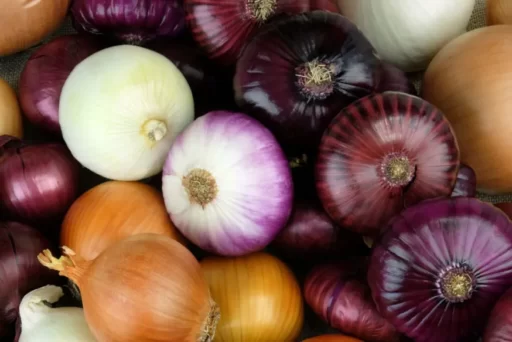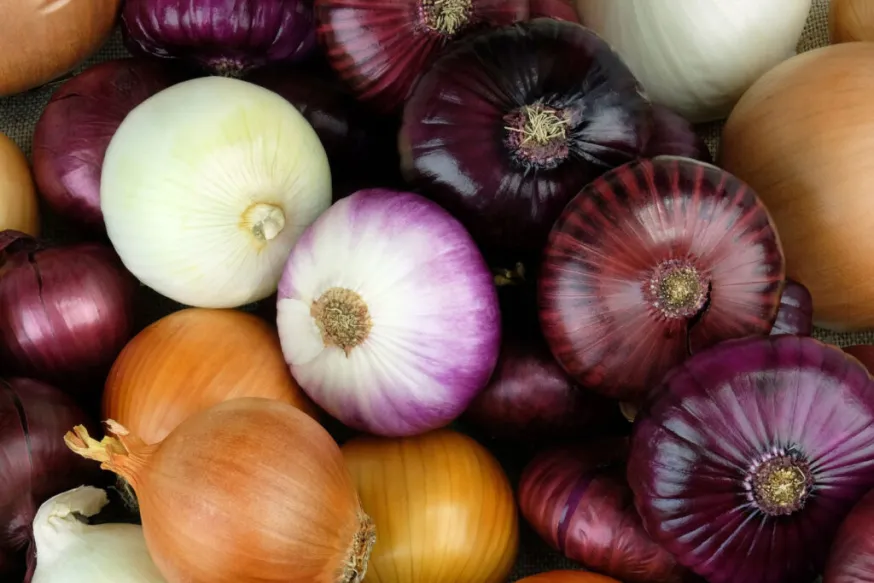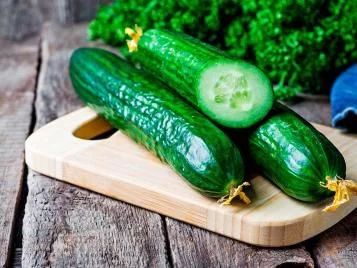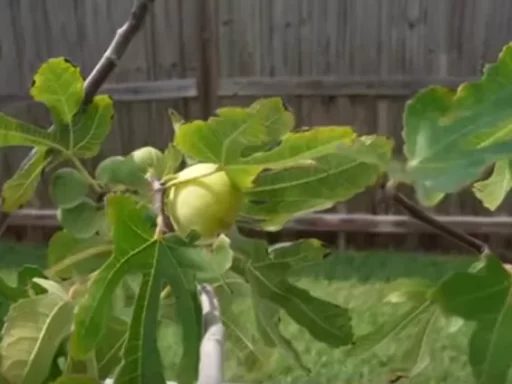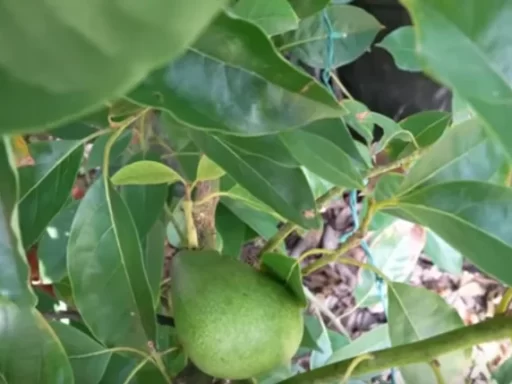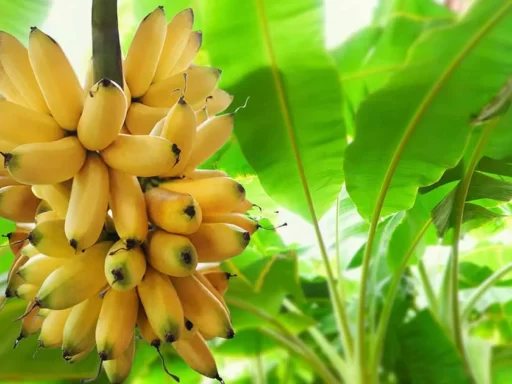Starting the new year on a high note, especially when you’re a gardener, is a beautiful experience. Even though it’s still early in the year, it’s the perfect time to get started with growing onions. In fact, planting onion seeds as early as possible can significantly improve your chances of a successful harvest. Today, I’ll be sharing six genius tips that will help you grow the most robust and largest onions you’ve ever harvested. These tips have been tried and tested, and they will ensure that your onions grow strong and healthy.
Tip #1: Onion Seeds vs. Onion Sets – What’s Better?
A common debate in the gardening world is whether to grow onions from seeds or from sets (small onion bulbs). Through years of experience, I can confidently say that growing onions from seeds is the way to go for a couple of key reasons.
Cost-Effectiveness
Growing onions from seeds is significantly more cost-effective. For instance, a $10 pack of onion seeds can yield around 900 onions. Compare that to buying onion sets, which can cost ten times as much for the same number of onions. With seeds, you’re getting a massive return on your investment.
More Reliable Growth
The second reason I recommend using seeds is cultural. Onions are biennials, meaning they complete their life cycle over two years. When you plant an onion set, it might think it’s already in its second year and attempt to flower prematurely, leading to smaller bulbs. Onions grown from seeds, however, don’t face this confusion and develop properly, ensuring that you get large, healthy bulbs.
Tip #2: Choosing the Right Onion Varieties Based on Day Length
To grow the best onions, it’s crucial to select the right variety based on your location’s latitude and day length during the summer solstice. Onions bulb based on the length of the day, so choosing the correct variety for your region is essential.
Day-Length and Varieties
Onions are classified into three types based on day length:
- Short-day onions: These onions bulb when the days reach 10 to 12 hours in length. They’re best for gardeners in southern regions with mild winters.
- Long-day onions: These require 14 to 16 hours of daylight to bulb and are better suited for northern climates.
- Intermediate-day onions: These fall in the middle and are ideal for gardeners in zones that have day lengths between 12 to 14 hours during the summer.
Choosing the correct variety based on your location will ensure that your onions bulb properly and reach their full potential.
Tip #3: Timing is Everything When Planting Onions
Onions bulb based on the day length, so it’s essential to time your planting carefully. The goal is to have your onions mature during the longest days of summer.
Planting Schedule
Here’s how to plan it:
- For short-day onions: You want to plant your seeds about 140 days before the summer solstice. This means starting seeds indoors in January and transplanting them into the garden by early March.
- For long-day onions: The best time to start your seeds is around February, with transplanting in early spring. This timing ensures that the onions will bulb when the days are long enough.
If you nail this timing, your onions will hit their peak just after the solstice, giving you the largest bulbs possible.
Tip #4: The Best Soil for Growing Onions
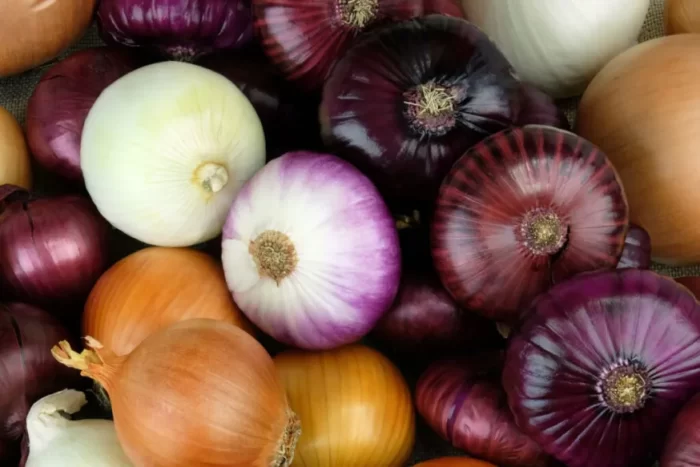
Onions grow best in loose, loamy soil that provides minimal resistance to their expanding bulbs. The key to growing large onions is ensuring that the soil is loose enough to allow the bulbs to expand without obstruction.
Preparing the Soil
If your soil is dense or heavy, work in plenty of organic matter like compost. Aim to mix in at least 2 to 3 inches of compost into the top layer of the soil to ensure it’s loose and well-draining. After planting your onions, cover them with a layer of mulch. The mulch not only retains moisture but also adds organic matter as it decomposes, keeping the soil loose and ideal for bulbing.
Tip #5: Interplanting Onions for Better Growth
Onions are shallow-rooted plants, making them ideal for interplanting with deeper-rooted crops like peppers. Interplanting offers several advantages, including maximizing your garden space and providing natural pest control.
Benefits of Interplanting
- Pest Repellent: Onions are part of the allium family, and their strong scent helps deter pests. Planting onions near pest-prone crops like tomatoes, peppers, and eggplants can protect these plants from common garden pests.
- Shade Protection: Tall crops like peppers can offer much-needed shade to onions during the hotter months, protecting them from excessive heat and allowing them to mature properly.
Just ensure that you interplant onions with crops that have compatible root systems and similar fertilizer needs for the best results.
Tip #6: Proper Irrigation and Fertilization for Onions
Onions thrive in consistently moist, but not waterlogged, soil. The best way to achieve this is by using drip irrigation, which delivers water slowly and allows it to penetrate deeply into the soil.
Irrigation Techniques
Drip irrigation ensures that the soil remains evenly moist without waterlogging the onions. Pairing this system with mulch further helps retain moisture. Typically, watering once a week is sufficient, but be sure to adjust based on your local climate and soil conditions.
Fertilization Schedule
Onions are heavy feeders and benefit from a steady supply of nutrients throughout their growing season. Start by incorporating an organic 5-5-5 fertilizer into the soil when planting, and continue to feed them every few weeks during their growth period to ensure large, healthy bulbs.
Frequently Asked Questions
1. When is the best time to plant onion seeds?
The ideal time to plant onion seeds is about 140 days before the summer solstice, usually in January for short-day onions or February for long-day varieties.
2. What is the difference between onion sets and onion seeds?
Onion seeds grow into onions over two seasons without any dormancy period, while onion sets are bulbs that can prematurely flower, leading to smaller onions.
3. Can onions be grown in containers?
Yes, onions can be grown in containers as long as the soil is loose and the container is deep enough to allow the bulbs to expand.
4. What type of soil is best for growing onions?
Loose, loamy soil with good drainage is best for onions. Adding compost to the soil can improve its structure and provide essential nutrients.
5. How often should I water my onions?
Onions prefer consistently moist soil. Using drip irrigation, water them deeply about once a week, adjusting based on your climate.
6. Do onions need fertilizer?
Yes, onions are heavy feeders. Use a balanced organic fertilizer at the time of planting and continue to feed them every few weeks during their growing period.
7. What plants can be interplanted with onions?
Onions can be interplanted with plants like peppers, tomatoes, and eggplants, as they benefit from onions’ pest-repellent properties.

